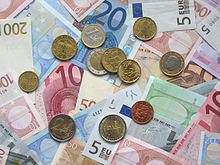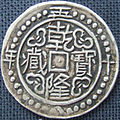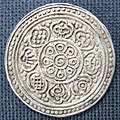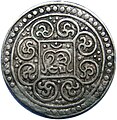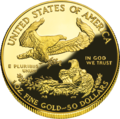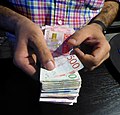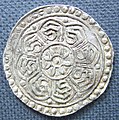The Money PortalEuro coins and banknotes
Money is any item or verifiable record that is generally accepted as payment for goods and services and repayment of debts, such as taxes, in a particular country or socio-economic context. The primary functions which distinguish money are: medium of exchange, a unit of account, a store of value and sometimes, a standard of deferred payment. Money was historically an emergent market phenomenon that possessed intrinsic value as a commodity; nearly all contemporary money systems are based on unbacked fiat money without use value. Its value is consequently derived by social convention, having been declared by a government or regulatory entity to be legal tender; that is, it must be accepted as a form of payment within the boundaries of the country, for "all debts, public and private", in the case of the United States dollar. The money supply of a country comprises all currency in circulation (banknotes and coins currently issued) and, depending on the particular definition used, one or more types of bank money (the balances held in checking accounts, savings accounts, and other types of bank accounts). Bank money, whose value exists on the books of financial institutions and can be converted into physical notes or used for cashless payment, forms by far the largest part of broad money in developed countries. (Full article...) Selected article -
In Christian tradition, the love of money is condemned as a sin primarily based on texts such as Ecclesiastes 5:10 and 1 Timothy 6:10. The Christian condemnation relates to avarice and greed rather than money itself. The Christian texts (scriptures) are full of parables and use easy-to-understand subjects, such as money, to convey the actual message, there are further parallels in Solon and Aristotle, and Massinissa—who ascribed love of money to Hannibal and the Carthaginians. Avarice is one of the seven deadly sins in the Christian classifications of vices (sins). This is a phrase that was borrowed from Diogenes. (Full article...)
Selected currency - The euro (symbol: €; currency code: EUR) is the official currency of 20 of the 27 member states of the European Union. This group of states is officially known as the euro area or, more commonly, the eurozone. The euro is divided into 100 euro cents. The currency is also used officially by the institutions of the European Union, by four European microstates that are not EU members, the British Overseas Territory of Akrotiri and Dhekelia, as well as unilaterally by Montenegro and Kosovo. Outside Europe, a number of special territories of EU members also use the euro as their currency. Additionally, over 200 million people worldwide use currencies pegged to the euro. (Full article...)Did you know -
Related portalsGet involvedFor editor resources and to collaborate with other editors on improving Wikipedia's Money-related articles, see WikiProject Numismatics. Need help?Do you have a question about Money-related content on Wikipedia that you can't find the answer to? Consider asking it at the Wikipedia reference desk. General images - The following are images from various currency-related articles on Wikipedia.
In the news
CategoriesTopics– By region –
– By name –
– By country –
– Historical currencies –
– Other –
WikimediaThe following Wikimedia Foundation sister projects provide more on this subject:
SourcesMore portals |
© MMXXIII Rich X Search. We shall prevail. All rights reserved. Rich X Search

